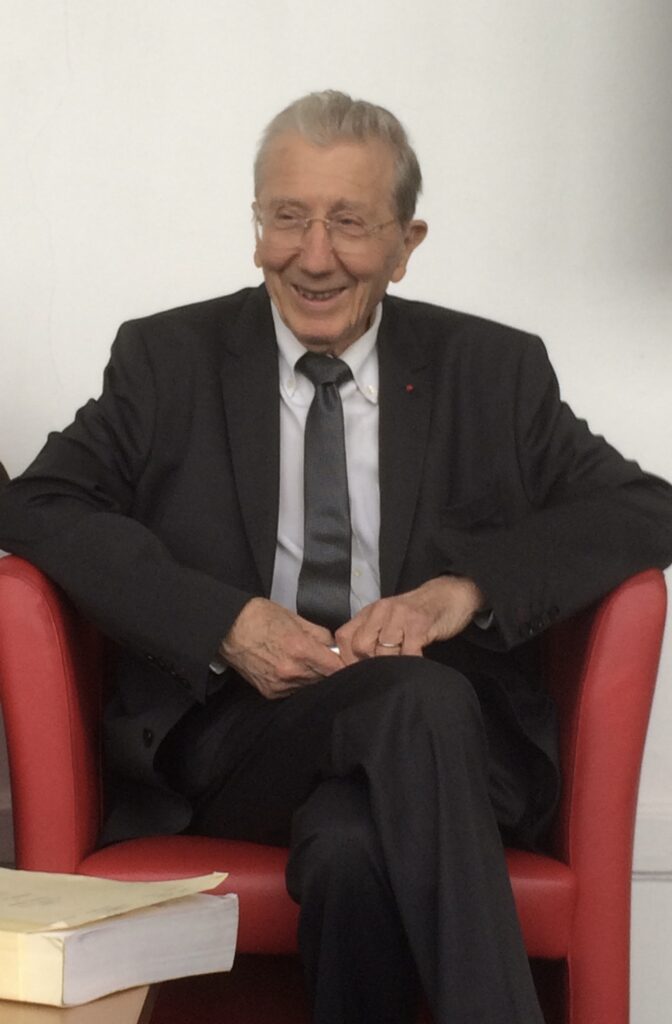Tribute to Professor Michel Boulangé
(16 December 1929 – 11 June 2025)

Michel Boulangé passed away on 11 June 2025, in his 96th year. Born in Nancy on 16 December 1929 into a family of teachers, he embodied throughout his life the values of transmission, intellectual rigor, and humanism. He began his medical studies in 1948, joined the Physiology Laboratory as an assistant in 1951, and obtained the prestigious agrégation in physiology ten years later, thus beginning an exceptional scientific and academic career.
The life of Professor Boulangé can be understood in three major phases, each marked by excellence, passion, and a deep sense of service.
- The Physician, Researcher, and Physiologist
The first stage of his career was as a professor of fundamental and applied physiology. Early on, during his pediatric internship, he focused on the metabolism of water in infants—at a time when dehydration from gastroenteritis was a major cause of mortality. His pioneering work on the exploration of body fluid compartments led him to establish a research laboratory that later became part of INSERM Unit 272 – Medicine and Human Development Biology, under the direction of Professor Paul Vert.
In 1973, with the opening of the Brabois Hospital, he founded and led the Laboratory of Renal and Endocrine Functional Investigations, reinforcing the role of physiology at the core of hospital care.
This period was also marked by his deep commitment to aerospace medicine. A glider pilot and aviation enthusiast, he was strongly influenced by Professor René Grandpierre, a pioneer in the field. Boulangé directed for many years the Diploma in Aeronautical Medicine, now known as the Capacity in Aerospace Medicine. In 1981, he organized the International Congress of Aeronautical and Space Medicine in Nancy.
A member of the International Academy of Aerospace Medicine, he also sat on the Civil Aviation Medical Board, presided over the Pont-Saint-Vincent Aeroclub and the Regional Gliding League, and led working groups on the physiological aspects of glider flight. As a reserve military physician, he attained the rank of Colonel.
- The University Builder and Man of Institutions
The second phase of his career was distinguished by major administrative responsibilities. He served as Vice-Dean of the Faculty B of Medicine, a member of the Medical Commission of the University Hospital, and Vice-President of the Scientific Council of the University.
In 1976, he was elected President of the University of Nancy I. In this capacity, he participated in numerous academic, economic, and regional bodies. He played a key role in the creation and development of several faculties, including the Faculty of Sports Sciences and the Science and Technology of Wood program in Épinal, and he also served on the Economic and Social Council of Lorraine, where he became Vice-President, as well as on the Regional Transport Commission.
After passing the presidency to Professor René Mainard in 1981, he returned to it in 1989 for a second term, during which he launched several significant projects, including the creation of engineering schools and IUT departments. In the interim, he represented universities at the District Council of the Greater Nancy Area, with responsibility for university affairs.
He also contributed to the development of the Conservatories and Botanical Gardens, and was elected President of the Central Horticultural Society of Nancy.
Ever attentive to public health, he served as President of the Regional Health Advisory Committee, and from 1999, of the Regional Health and Social Affairs Observatory. His commitment extended to the financial sector as well, where he was a board member and later President of the Banque Populaire of Lorraine for ten years.
- III. The Reformer of Medical Hydrotherapy
The third phase of his career was devoted to thermal medicine and climate-related healthcare. In 1980, following the death of Professor Marcel Lamarche, he took over the teaching and research in medical hydroclimatology, both locally and nationally.
He structured the Capacity in Hydroclimatology program, chaired the High Committee on Thermalism and Climatic Medicine, and later presided over the International Society of Medical Hydrology (ISMH). In 1996, he organized the World Congress of Medical Hydrology in Nancy and Vittel, affirming his global recognition in the field.
In honor of his commitment to the revival of the Nancy thermal spa site, a borehole at Nancy Thermal now bears his name.
A Man of Culture, Sensibility, and Heart
A lifelong friend of the Nancy Museum of Fine Arts, he supported the publication of the journal Péristyles, securing sponsorship from the Valvital Thermal Company.
A gifted writer and cultural advocate, he penned forewords to several books on the École de Nancy, presided over the Lorraine Section of the French Orchid Society, founded AJABONA, and served as Vice-President of the Jardiniers de Stanislas. He brought to life major botanical exhibitions such as Orchid’Expo 1984 and Orchidées 2004.
He also contributed to the 2005 Year of Enlightenment and was a member of the Académie de Stanislas and the Lorraine Academy of Sciences. He authored nearly 350 scientific publications throughout his career.
Professor Michel Boulangé leaves behind a tremendous intellectual, scientific, cultural, and human legacy. His name will forever be associated with medical research, academic reflection, the promotion of nature and art, and a humanistic vision of science, grounded in beauty, transmission, and shared progress.
A tribute to Professor Michel Boulangé will be held during the Université du Thermalisme on 11 September 2025, at 12:30 pm and 6:00 pm (Paris time).
32 rue Félix Faure 54000 Nancy
contact@amisduthermalisme.com
Les amis du thermalisme
©2024 All rights reserved SolDigit
